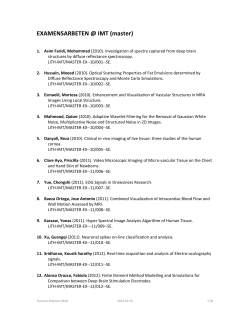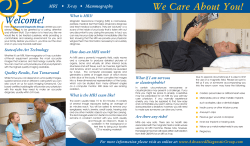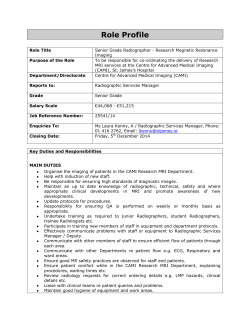
Thank you for your interest in our research study! Inside you will find
Spinal Cord MRI Research Study for Children, Adolescents, and Young Adults with Transverse Myelitis Thank you for your interest in our research study! Inside you will find the answers to many frequently asked questions about the study. ` For more information call Nadia at 781-216-1199, email her at spineimaging@childrens.harvard.edu, or visit us at www.childrenshospital.org/research-andinnovation/research-labs/pain-group For more information call Nadia at 781-216-1199, email her at spineimaging@childrens.harvard.edu or visit www.childrenshospital.org/research-andinnovation/research-labs/pain-group Seeking 7-21 year old participants with transverse myelitis or who are healthy and pain-free Q : W hat is an M RI? A: MRI (Magnetic Resonance Imaging) is a safe and painless procedure that uses a standard clinical MRI machine to take pictures of your body (in this case, your back) and its structure. Standard Clinical MRI Machine Q : W hat risks are associated w ith M RI? A: MRI does not involve any exposure to ionizing radiation and thus poses almost no risk to the average patient. It does however involve a strong magnetic field, which although not harmful by itself, may cause implanted medical devices that contain metal to malfunction in patients who have them. Thus, patients with any such devices are not eligible for the study. Q : W hy are w e asking children and young adults w ith transverse m yelitis to participate? A: We are interested in how the structure of the spinal cords of people with transverse myelitis is different from people without back pain or injuries. This information may lead to a better diagnosis of transverse myelitis, which in turn may lead to better treatment for the many patients who are affected. Q : W hat does this study involve? A: This study will take place at Boston Children’s Hospital in Waltham. It will involve a short evaluation by our study physician to test things such as reflexes and to assess the back injury using an ASIA exam, if such an exam has not been done before. Once cleared, participants may take part in pain sensitivity testing, which is a safe and accurate way of testing your skin’s sensitivity to things like temperature and pressure. After the sensory testing, the patient will be asked to lie still in an MRI machine for a 45-minute scan where they will not be asked to do anything else. They will then have a second 45-minute MRI either after a break or on another day. testing, and 1.5 hours total for the two 45minute MRI scans). Q : W ho is eligible? A: 7-21 year old individuals with transverse myelitis. Healthy 7-21 year old individuals with no pain are also eligible for the control group of the study. Q : W ill I get anything for participating? A: Participants will receive a $50 gift card for each MRI study session they participate in, or $100 in total. They will also receive an additional $10 gift check each time they refer a friend who qualifies for the study as a healthy volunteer (limited to three qualifying friends). Parking at the Boston Children’s Hospital in Waltham is free. Q : W ho w ill see the inform ation I give and m y results from the study? A: Your name will be replaced with a code that only the researchers will know. Once your name has been removed, the information and results that you give will be combined with the information and results from other people like you. Quantitative Sensory Testing Q : How long does this study take? A: Each study session may take up to 3.5 hours (up to 1 hour for the physician evaluation, 1 hour for pre-scan sensory Q : How do I sign up? A: To learn more about this study or sign up, please call 781-216-1199 and ask for Nadia (the primary investigator) or email her anytime at spineimaging@childrens.harvard.edu.
© Copyright 2025












